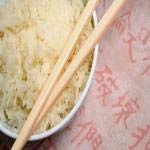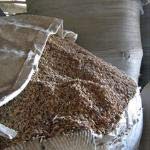
People worried about heart attacks get a lot of advice about what to eat: less fat; more fruits; more vegetables. New research suggests the most important thing they can do may be to simply eat more rice.
It's hard to imagine needing justification to eat rice — for much of the world, it's the major component of every meal. But Japanese researcher Satoru Eguchi says in Japan, rice has been losing popularity to other more Westernized staples.
"Japanese people have more of a Western diet in past 50 years," he notes. "We ate 50 percent less rice compared to 50 years ago in Japan." And that trend had some Japanese doctors worried. They believed the traditional diet, based largely on fish and a lot of rice, was healthier than the high fat, high protein diet Japanese were beginning to adopt.
A surprising compound in a bowl of rice
Studies have shown the heart-healthy value of fish, but there is no equivalent research into the benefits of rice. It's known that rice has fiber and some vitamins, and Eguchi and his colleagues at Temple University in Philadelphia were convinced there was even more to it.
What they discovered is that there's a component in rice that can actually prevent heart attacks.
It works by inhibiting a hormone called angiotensin II. The hormone can cause blood vessels to narrow and excess sodium to accumulate in the blood. These are factors that lead to cardiovascular diseases like high blood pressure and hardening of arteries.

There are a number of medications available that block angiotensin. Eguchi says his research shows you may be able to get the same benefits from eating rice.
But not just any rice. In fact, brown rice, often believed to be the grain's healthiest incarnation, turns out to be the worst option, when it comes to this angiotensin-blocking compound.
"Most of the nutritious part cannot really be digested, because the brown rice shell is so hard," he explains. "We actually cannot really absorb the nutrition. And to make the brown shells sufficiently soft to digest, you need to cook rice longer, need more heat, [so you are] not really keeping that protective ingredient."
Getting the most benefit from the grain
The heart-attack-stopping compound comes from the layer just under the fiber-rich but hard to digest outer shell of brown rice. By the time you boil brown rice for 45 minutes to make it soft enough to eat, you've basically boiled out the nutrition.
White rice cooks for less time, but most of that nutritious inner layer has been polished off to get that light and fluffy texture.
But Eguchi says there is a third option. It's possible to "half polish" rice — or to polish away the hard outer shell, while leaving the nutritious inner layer intact. "By this way you can most effectively digest the nutritious part."
In Japan, that style of rice is called haigamai. Eguchi says among some Japanese, it is already a popular choice, because of perceived health benefits. Now, thanks to his research, those assumptions have scientific backing.
The process to make haigamai rice is not complicated; all it takes is to stop polishing rice before it fully becomes white rice. It is a technique that could be replicated by rice producers around the world.
For those who don't like rice — or don't want to switch from the standard brown or white options — Eguchi and colleagues are working to extract the compound to develop a new, natural medication.
Eguchi presented his research to scientists and doctors this week at the Conference of Experimental Biology.
sodium: a chemical element.Sodium is a soft silver-white metal that is found naturally only in compounds, such as salt 钠
angiotensin: any of several polypeptides that narrow blood vessels and thus regulate arterial pressure 血管紧缩素
Large amounts of added sugars increase risk of heart disease
Eating more 'good' fats lowers risk of heart disease
What the world's healthiest people eat
(来源:VOA 编辑:陈丹妮)
